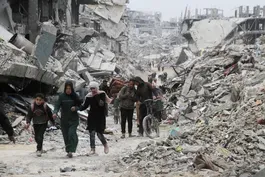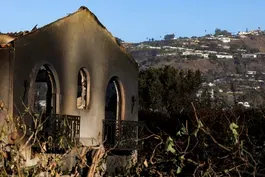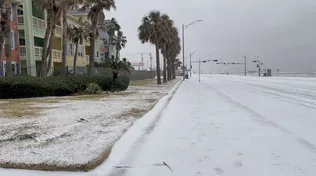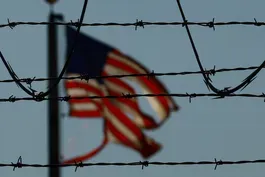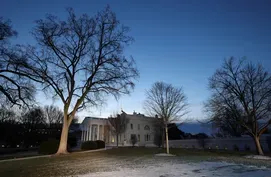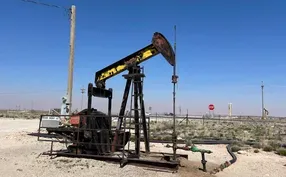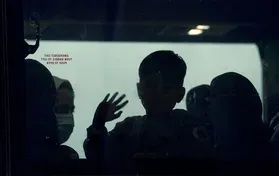
Incarcerated firefighters help battle the blazes around LA
Clip: 1/22/2025 | 6m 30sVideo has Closed Captions
How incarcerated firefighters are helping battle the blazes around Los Angeles
The fire danger in Southern California is far from over. As crews continue their battle, incarcerated firefighters part of a long-running state program are on the frontline. Supporters say the program offers a pathway out of prison, but critics say the work and pay are exploitative. Stephanie Sy discussed more with Sam Lewis of the Anti-Recidivism Coalition.
Major corporate funding for the PBS News Hour is provided by BDO, BNSF, Consumer Cellular, American Cruise Lines, and Raymond James. Funding for the PBS NewsHour Weekend is provided by...

Incarcerated firefighters help battle the blazes around LA
Clip: 1/22/2025 | 6m 30sVideo has Closed Captions
The fire danger in Southern California is far from over. As crews continue their battle, incarcerated firefighters part of a long-running state program are on the frontline. Supporters say the program offers a pathway out of prison, but critics say the work and pay are exploitative. Stephanie Sy discussed more with Sam Lewis of the Anti-Recidivism Coalition.
How to Watch PBS News Hour
PBS News Hour is available to stream on pbs.org and the free PBS App, available on iPhone, Apple TV, Android TV, Android smartphones, Amazon Fire TV, Amazon Fire Tablet, Roku, Samsung Smart TV, and Vizio.
Providing Support for PBS.org
Learn Moreabout PBS online sponsorshipGEOFF BENNETT: The fire danger in Southern California is far from over.
And as first responders continue their battle against major wildfires, there's also renewed attention around a lesser known group that's also on the front lines.
That's incarcerated firefighters.
Stephanie Sy has more.
STEPHANIE SY: More than 1,000 of the firefighters that have been battling the Southern California wildfires are convicts, part of a long-running state program.
Training and deployment onto the fire lines is voluntary, with inmate firefighters making a maximum of about $10 a day or up to $30 if they work a 24-hour shift.
They may also qualify to get two days shaved off their sentence for every day they work.
The state has become reliant on these men and women during the increasingly long fire season, and the program is estimated to save California tens of millions of dollars a year.
Supporters say the program offers a pathway out of prison, but critics say the work and pay are exploitative.
For more, I'm joined by Sam Lewis, executive director of the Anti-Recidivism Coalition.
Sam, thank you so much for joining the "News Hour."
I understand that you have personally visited these firefighters at their base camps in L.A. very recently.
Tell me, how is their morale?
Are they pumped that they're able to help in this crisis?
SAM LEWIS, Executive Director, Anti-Recidivism Coalition: Absolutely.
So I was able to visit both of the base camps, one at the Holton base camp.
The other was in the Rose Bowl.
Morale is high.
As one of the hand crews said: "This is my way of giving back.
I made mistakes in the past, but this clearly demonstrates that redemption is possible."
And so we threw the football around a little bit.
They had great food from our public from people that have donated.
We had a lot of other people that visited just to let them know how much that we appreciate them and how grateful we are for them actually helping suppress this fire.
STEPHANIE SY: I have seen pictures of even celebrities visiting these incarcerated firefighters.
Now, I know, on the fire lines, they have to wear a special uniform, an orange uniform that depicts them as inmates.
Do they face unique challenges in their role?
And are they treated any differently than other firefighters, as far as you can tell?
SAM LEWIS: I could not tell the difference.
For instance, both firefighters that are not incarcerated and the hand crews both work 24-hour shifts.
They sleep in tents on the base camps.
When it's time for them to take breaks at the fire line, they literally will go -- will lay on the ground.
And that's true of regular firefighters also.
I have pictures of firefighters using their helmets to take a nap when it's time for them to have a break.
And so the difference is, one person is incarcerated and the other one isn't.
And the pay is another.
However, I must say that Assemblymember Isaac Bryan has now introduced a bill to fix the pay inequity in this particular program.
STEPHANIE SY: Some of them get paid as low as a dollar a day.
And, to that point, the program has drawn criticism, as I'm sure you're aware over the years.
I want to play with Amika Mota, a criminal justice reform advocate and former inmate firefighter herself, told us earlier today.
AMIKA MOTA, Sister Warriors Freedom Coalition: It's wild to think that we are not even paying minimum wage to people that are doing this extremely dangerous work.
But that is the other issue.
It is very dangerous work.
Folks are often signing their rights away to be out there fighting fires on the fire ground.
And folks are not being equipped with a path to solid career firefighting wages when they come home.
That's not to say there are not programs that exist, but they're not enough.
They're not sufficient for what we need to actually be supporting people to make their way into firefighting careers when they get home.
STEPHANIE SY: Sam, what is your response to some of her points?
We talked about compensation, but what about some of the other points that she makes?
SAM LEWIS: In the past, those points were correct.
Pay is still at this -- the Assembly Bill 147 has not passed yet.
It is in progress.
But I would hope that voters would definitely support Assemblymember Isaac Bryan in making sure that hand crews are paid equivalent of the lowest-paid firefighters on the line.
In terms of a pathway, ARC has helped create a pathway with California wildland firefighters and the California Department of Corrections and Rehabilitation called the Ventura Training Center.
This is an incredible program that allows people that have been incarcerated in that are hand crews in fire camps to come home, train to become certified firefighters, get their record expunged, and get their EMT license, and become either Cal Wildlands firefighters or firefighters in municipalities.
There's a second site we just opened up in the past year called the Los Angeles Training Center.
And this -- we have completed our first cohort.
We're about to start our all women's cohort for this firefighting program that would also create pathways for people that are coming out of these camps to become full-time either Cal Wildlands firefighters or municipal firefighters throughout the state of California.
STEPHANIE SY: You were incarcerated yourself years ago, Sam, and I imagine you and others face stigma once you have paid your debt to society.
You go out.
And it's hard, we hear over and over, for the formerly incarcerated to get jobs.
Is it any different really for these firefighters?
SAM LEWIS: Initially, it was.
But now VTC, the Ventura Training Center, has been up and standing since 2018.
We put over 200 formerly incarcerated firefighters into firefighting careers.
And so, when they're welcomed into this unique community of firefighters, as I have heard some of the chiefs say, some of the battalion chiefs say, it's a way of life.
It's not just a career.
And so they're welcomed into a different lifestyle.
And it's 100 percent.
We'd love for you to be able to come see some of our graduations, because this is 100 percent true when it comes to welcoming people that have been incarcerated into a different level of redemption, just demonstrating that they have always had value as human beings.
Now we see them being given the opportunity to live their best life and become the best version of themselves.
STEPHANIE SY: Sam Lewis with the Anti-Recidivism Coalition, thanks for your insights.
SAM LEWIS: Thank you.
Thank you so much.
A Brief But Spectacular take on art bringing people together
Video has Closed Captions
A Brief But Spectacular take on the art of bringing people together (3m 15s)
Gazans begin clearing rubble as tenuous ceasefire holds
Video has Closed Captions
Gazans return to homes in ruins and begin clearing rubble as tenuous ceasefire holds (5m 20s)
Honoring the lives lost in the Los Angeles wildfires
Video has Closed Captions
Honoring the lives lost in the Los Angeles wildfires (3m 6s)
News Wrap: Storm brings record-breaking snow to Gulf Coast
Video has Closed Captions
News Wrap: Massive winter storm brings record-breaking snow to Gulf Coast (5m 28s)
Pentagon to send troops to border for Trump's crackdown
Video has Closed Captions
Pentagon will send troops to southern border to carry out Trump's immigration crackdown (6m 7s)
Trump administration ends government diversity programs
Video has Closed Captions
Trump administration ends government diversity programs and takes aim at DEI nationwide (4m 34s)
Trump begins push for more oil and gas production
Video has Closed Captions
Trump pushes for more oil and gas production and a roll-back of climate initiatives (7m 12s)
Trump issues more orders targeting immigration and DEI
Video has Closed Captions
Trump issues more executive orders targeting immigration and DEI (3m 25s)
Trump order cancels flights for refugees to settle in U.S.
Video has Closed Captions
Refugees already cleared to settle in U.S. have flights canceled after Trump order (6m 8s)
Providing Support for PBS.org
Learn Moreabout PBS online sponsorshipMajor corporate funding for the PBS News Hour is provided by BDO, BNSF, Consumer Cellular, American Cruise Lines, and Raymond James. Funding for the PBS NewsHour Weekend is provided by...


